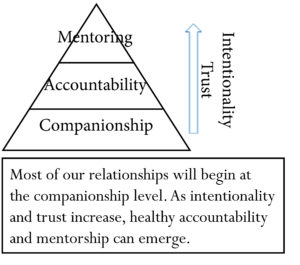Keys to Accountability
“Confess your faults one to another, and pray one for another, that ye may be healed…” James 5:16
In the Scriptures we see a clear call to be encouragers and supports to each other. As “members one of another” (Romans 12:5), we are to lean upon Christ and the collective strength of his Body to help us to overcome and grow. One area where we frequently see this role of the Body played out is in the area of accountability.
What does accountability look like?
Accountability is defined by Merriam-Webster as “a willingness to accept responsibility for one’s actions.” It is rooted strongly in the realizations that you, and only you, are responsible for your behavior and choices, but also that there is health and help in allowing others to see parts of your life you have previously tried to hide. A good accountability partner is someone willing and able to invest the time and energy needed into the relationship. Personal experience with the struggle and spiritual maturity gained through overcoming can add to the depth of the accountability relationship. However, you don’t need to look for someone with the exact same struggle in order to still receive help. It takes initiative on the part of the one struggling to first reach out to another and ask for help in the form of accountability. This first step is often the most difficult in the relationship.
How does accountability differ from other relationships?
Mentoring? Accountability? Companionship? Most of our relationships will begin at the companionship level. As intentionality and trust increase, healthy accountability and mentorship can emerge.
What are keys to successful accountability?
Be committed. Initiate regular and consistent contact with your accountability partner(s) instead of waiting on them to contact you. Typically, accountability is required more frequently at first or at more difficult times and then should somewhat taper with success in overcoming. Be proactive. Plan on proactive accountability first, and reactive accountability only when needed. Proactive: anticipating times of weakness and informing your partner(s) before meeting the temptation with a plan to prevent. Consider having a specific day or time where you check-in consistently. Having a scheduled check-in can be a helpful way to engage proactive accountability. Be Reactive: confessing to a failure and discussing how the behavior could have been prevented. Be consistent. Change takes time. Celebrate victories, pick yourself up after setbacks, repent, learn, and continue to grow. Be real. Be willing to invest deeply in each other’s lives and ask hard questions. See progression. Meeting in person can seem cumbersome but is most effective, especially early on. Over time, meetings might evolve to the effective use of technology such as texting.
Specific keys for helpers
There will be times when accountability relationships grow to be more one-sided, with one individual pouring into the other individual as he/she strives to overcome. In these situations, a few keys for the helpers are important: Be confidential. Nothing destroys trust and accountability as quickly as breached confidentiality. Expect change while offering hope.
Expect, even demand, growth but offer the hope of the Gospel as well.
It is critical to prayerfully strive for a balance between grace and truth when helping others. Know when to reach out for further help. Sometimes we can find ourselves in areas where we feel unqualified or where we believe those we are helping may need more help than we alone can offer. Know who your resources are. Be honest with your partner in these situations. Gently but firmly suggest the need for involvement from others. Be willing to seek counsel from your elder in such situations as well.
A note about groups
Accountability will most often start as a one-on-one relationship. However, with certain circumstances (i.e., severity of situation, continual struggling in certain areas), this accountability might shift toward a group model. A group of 3-5 concerned brothers or sisters in Christ can offer a community of support for those struggling which one individual by themselves can not. They can work together to ensure an individual feels supported, challenged, and loved. For more information, see The Role of Mentoring and Support Groups.
Resources to help: A simple texting conversation can be set up with your accountability partner/group enabling you to quickly reach for prayer and help proactively when you are being tempted. Several smartphone apps can be used to assist with accountability (Note: be sure smartphones are enabled with filtering and monitoring controls in order to minimize temptation). Some recommended apps are:
o “Nomo” – allows individuals to track their current period of victory and share with others in the group. Each member can work toward extending their own period of victory.
o “rTribe” – members define who is in their “tribe” (accountability group) and then members can “check in” with one another. There are prompts to remind one to check in, and there is an easy way for users to quickly inform the others he/she is being “triggered,” asking for help and prayer.
The Seven Principles of Highly Accountable Men, (Mark Laaser, Beacon Hill Press, 2011), lays out key accountability principles and talks through effectively putting them into practice. Creating sample Accountability Questions can help direct conversation and mentorship.
One Final Note
In Luke 22, Christ says this concerning Peter, “…behold, Satan hath desired to have you, that he may sift you as wheat: But I have prayed for thee, that thy faith fail not: and when thou art converted, strengthen thy brethren.” (v. 31-32). We, likewise, have an Adversary who desires to “sift us as wheat.” And we, likewise, have the opportunity to pray for each other, encourage each other, and strengthen each other through the grace which God gives us all.
Click here for printable document





Comments
Leave a Comment